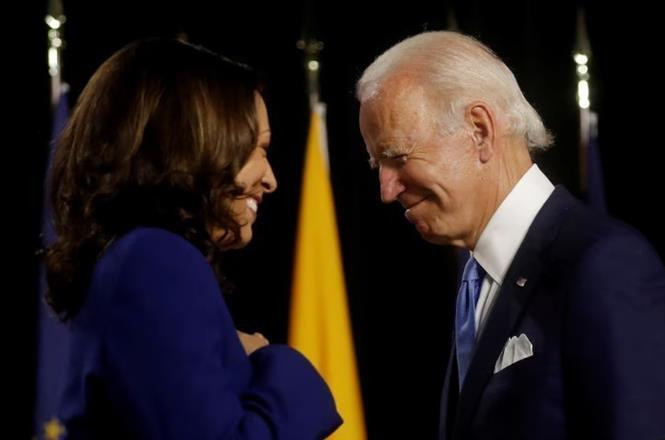After US President Joe Biden decided to end his re-election campaign, the Democratic Party will have two options to find a replacement candidate to represent the Democratic Party in the confrontation with former President Donald Trump.

One is an online vote to choose a new candidate in early August, and the other is an open convention. The last time the Democrats held an open convention to choose a replacement presidential candidate was in 1968.
An open convention is held when no candidate wins a majority of delegates. As a result, the Democratic National Convention turns into a mini-primary election in which candidates compete to convince delegates to vote for them.
But with less than a month to go until the Democratic National Convention, which is scheduled to open in Chicago on August 19, the Democratic Party is in turmoil.
Several states have an August deadline for receiving ballots for the general election, and early voting begins in some places in September. So party leaders will likely try to find a replacement candidate before the Democratic National Convention.
Who will choose the nominee?
More than 4,700 delegates representing voters will decide the party's nominee, whether or not the convention opens. Typically, these delegates will choose the winner of the previous primary.
But now that President Biden is out of the race, all delegates are free agents and will choose a candidate without a majority vote.
There are two types of Democratic delegates: delegates who are pledged to support the candidate in the state that the voter has chosen. The party allocates pledged delegates to each state or territory, and state party officials divide those delegates among the candidates; and superdelegates—the party’s top leaders. This group includes former presidents and vice presidents, Democratic governors, members of Congress, and party officials. They are not pledged to any candidate.
If Democrats go ahead with their long-planned online ballot, the party could officially name its nominee before the national convention begins.
When he announced his withdrawal from the race, President Biden threw his support behind Vice President Kamala Harris, which could dramatically tip the scales toward unity. His nearly 3,900 delegates are not required to support Harris, but they were chosen for their loyalty to him and may be inclined to do what Biden asks.
Even if a virtual vote is canceled, Democrats could still agree to make Harris or another candidate their official nominee before the convention. In that case, the convention would technically be considered open, but the process would be less dramatic.
Amy K. Dacey, former executive director of the Democratic National Committee, said Democratic leaders will have an incentive to resolve the issue quickly so the new nominee can begin campaigning as soon as possible.
But if there is no consensus before delegates arrive in Chicago, Democrats will hold their first open and contentious convention since 1968.
To be nominated, each candidate needs at least 300 delegates, and no state has more than 50 delegates.
Currently, Vice President Harris is still the most promising candidate for the Democratic presidential nomination.
Dozens of current and former members of the Democratic National Committee signed a letter endorsing Ms. Harris to replace President Joe Biden as the party's nominee.
“We believe that our strongest presidential candidate, the one who can offer the clearest, most unified vision for America’s future, is Vice President Kamala Harris,” the letter said.
In addition to praising President Biden, the letter calls on delegates to the 2024 Democratic National Convention and all voters in November to support Kamala Harris for President of the United States.
Meanwhile, several other potential Democratic presidential candidates are “in wait-and-see mode” in the coming hours to see how the election plays out following President Biden’s decision, as well as to gauge the level of Democratic unity around Vice President Kamala Harris. Sources close to Senator Joe Manchin of West Virginia say he is considering registering for the presidential race.
Harris’s nomination would be a historic moment for the Democratic Party, the first woman of color of South Asian descent to be nominated for president. But it is far from certain. Top officials, including former House Speaker Nancy Pelosi, prefer an open process. They believe a small primary could bolster the confidence of any Democratic candidate who can take on Republican Donald Trump.
“If you think there is a consensus among those who want President Joe Biden to step aside and support Vice President Harris, you are wrong,” Rep. Alexandria Ocasio-Cortez shared in a social media discussion post last week.
Few Democratic lawmakers who have lobbied Biden to drop out of the race mentioned Harris in their statements. Some have said they favor an open nomination process and back a new candidate.
Rep. Zoe Lofgren of California, a Pelosi ally, said on MSNBC that a primary with Harris' name on it would be appropriate.
Democratic Sens. Jon Tester of Montana and Peter Welch of Vermont both called on President Biden to drop out of the race and said they would support an open nominating process at the party's national convention.
On July 21, Democratic National Committee Chairman Jaime Harrison issued a statement stating that the party will conduct a “transparent and orderly” process to select a new candidate to replace President Joe Biden.
The statement affirmed that “in the coming days”, the Democratic Party “will launch a transparent and orderly process… with a candidate who can defeat Donald Trump in November”.